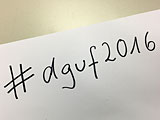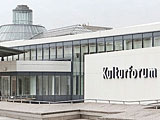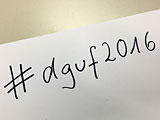
More on DGUF.de
The conference papers: Arch. Inf. 40, 2017
Conference programme
Detailed programme with abstracts (PDF)
Structure and regulations for the debates (PDF)
"Archäologie & Macht. Positionsbestimmungen für die Zukunft der Vergangenheitsforschung". More on the conference in German
Conference programme
Detailed programme with abstracts (PDF)
Structure and regulations for the debates (PDF)
"Archäologie & Macht. Positionsbestimmungen für die Zukunft der Vergangenheitsforschung". More on the conference in German
Archaeology and Power. Positionings for the future of researching the past.
Conference of the DGUF (German Society for Pre- and Protohistory) in Berlin from 5th to 8th May 2016
Doing Archaeology means working in a complex interplay of forces which includes the decision on how much of state archaeology will be managed by skilled personnel in the future and how strong archaeological institutions can act when there is a conflict of interests. Currently other protagonists are rapidly gaining influence, for instance those in social media. Laws with a huge effect on archaeology are adopted – and archaeology itself hardly acts or reacts, even though the professional future of archaeologists and the quality of their professional life and last but not least public interest in archaeology is on stake. How can and how must archaeology contribute in order to secure an acceptable future for the discipline and for researching the past?
At the 2016 DGUF conference we will address this central topic. We want to define the position of archaeology and of the trustees of archaeological heritage, outline fields of action and, by doing so, initiate the preparation of an agenda in favor of a discipline which currently is undergoing comprehensive changes.
Although the conference is partly meant as a continuation of the previous conference held in Tübingen in 2015, you are not required to be familiar with all the details of the Tübingen conference in order to participate or to give a talk at the Berlin conference.
Although the conference is partly meant as a continuation of the previous conference held in Tübingen in 2015, you are not required to be familiar with all the details of the Tübingen conference in order to participate or to give a talk at the Berlin conference.

Tweets, photos and videos on the conference:
Blogposts ezc.on the conference:
The conference subject in the mass media:
- Tweets of the conference more
- Many talks are available as videos in the YouTube channel of "Bergische Historiker" more
Blogposts ezc.on the conference:
- Sophie Hüglin, "Archaeology and Power" (The European Archaeologist 49, summer 2016, pp. 21-24) more
- Jaime Almansa Sánchez: "DGUF Conference 2016 - Experiencing politics in Berlin" (Online Journal in Public Archaeology, 18.5.) more
- Geesche Wilts, "Ein bisschen Balsam für die Seele – Die DGUF-Tagung 2016" (Blog Miss Jones, 9.5.) more
- Pascal Geiger: "DGUF Tagung 2016 Fazit" (Bergische Historiker, 22.5.) more
The conference subject in the mass media:
- "Archäologen sind oft konfliktscheu". Machtfragen in der Altertumsforschung. Gábor Paàl interviewing Diane Scherzler, chair of DGUF (SWR2 Campus, 7.5.; Audio, 6:34 min.)
The subtle shift of power
The autonomy of the discipline is changing: citizens, investors, politicians, media, managers from the sectors of education and science seize power in archaeology. What is happening here and how do we deal with it? Does the ongoing change in media accelerate the loss of autonomy or does it rather offer untapped chances? There is a growing political demand for more civic engagement, also in science. Will an increase in civic engagement in archaeology lead to a loss of control and power or is this a chance to strengthen archaeology?
The autonomy of the discipline is changing: citizens, investors, politicians, media, managers from the sectors of education and science seize power in archaeology. What is happening here and how do we deal with it? Does the ongoing change in media accelerate the loss of autonomy or does it rather offer untapped chances? There is a growing political demand for more civic engagement, also in science. Will an increase in civic engagement in archaeology lead to a loss of control and power or is this a chance to strengthen archaeology?
Topics of the conference
Our aim is to reflect upon the topic of Archaeology as a Profession and Power. Research funding: Who will receive funding and what for? The power of networks. Precariat and unstable contractual relationships: How does this influence the work done and to those who do it? Careers of young scientists: The unstable path leading towards a scientific career. Area of conflict: state archaeology – companies – universities.
Learning from the past? Archaeology and Power back then.
What can we learn from the history of science, i.e. its role during the Nazi era, in the GDR or with regard to networks within the early BRD? Looking back: What can we learn from the past for the current situation?
Law and Power: legal nit-picking only at first glance
Our aim is to take a look at ongoing legal developments: in the field of cultural heritage acts, monument protection laws, developments in EU legislation, class action, the Faro convention. What can we expect? Are we subjected to legal changes as if they were uncontrollable forces of nature or are we in the position to make a change?...and who could and should exert influence?
We want to understand: Psychology of Power
Clinging to formal power. Power and Responsibility. Delegating responsibility to a higher-ranking individual is a shift of power. Does this mean that professionals without any formal power cannot be held responsible, for instance with regard to protecting cultural heritage? We will be talking about avoiding conflicts in archaeology and the fear of exerting any influence. A psychological profile of the archaeological profession.
Learning from others: Institutions and NGOs
Today non-governmental organizations (NGOs) act in many fields by pooling civic interests according to themes and represent a counterweight and an addition to state organizations.. How does this work in the field of environmental and nature protection for example? Can archaeology learn from their experiences? Are NGOs necessary in archaeology? Do we need a professional association which will protect the "archaeologic profession" as such and which will strive to achieve fair employment conditions for archaeologists by mediating between employers and the unions?
Our aim is to influence attitudes: A New Understanding of Power in Archaeology
Archaeologists are the lawyers of cultural heritage. Protecting monuments inevitably leads to conflicts. The systems present in museums and in science are competitive. There are conflicts and competition everywhere. Instead of denying this or hushing it up, this fact should be accepted. It is essential to take on responsibility instead of delegating it to someone in a higher position, which might or might not be convenient. Archaeology is part of society, and citizens are both interested in it and willing to provide archaeology with power. How much power can we obtain?... and do we want to obtain that much power at all?
Our aim is to reflect upon the topic of Archaeology as a Profession and Power. Research funding: Who will receive funding and what for? The power of networks. Precariat and unstable contractual relationships: How does this influence the work done and to those who do it? Careers of young scientists: The unstable path leading towards a scientific career. Area of conflict: state archaeology – companies – universities.
Learning from the past? Archaeology and Power back then.
What can we learn from the history of science, i.e. its role during the Nazi era, in the GDR or with regard to networks within the early BRD? Looking back: What can we learn from the past for the current situation?
Law and Power: legal nit-picking only at first glance
Our aim is to take a look at ongoing legal developments: in the field of cultural heritage acts, monument protection laws, developments in EU legislation, class action, the Faro convention. What can we expect? Are we subjected to legal changes as if they were uncontrollable forces of nature or are we in the position to make a change?...and who could and should exert influence?
We want to understand: Psychology of Power
Clinging to formal power. Power and Responsibility. Delegating responsibility to a higher-ranking individual is a shift of power. Does this mean that professionals without any formal power cannot be held responsible, for instance with regard to protecting cultural heritage? We will be talking about avoiding conflicts in archaeology and the fear of exerting any influence. A psychological profile of the archaeological profession.
Learning from others: Institutions and NGOs
Today non-governmental organizations (NGOs) act in many fields by pooling civic interests according to themes and represent a counterweight and an addition to state organizations.. How does this work in the field of environmental and nature protection for example? Can archaeology learn from their experiences? Are NGOs necessary in archaeology? Do we need a professional association which will protect the "archaeologic profession" as such and which will strive to achieve fair employment conditions for archaeologists by mediating between employers and the unions?
Our aim is to influence attitudes: A New Understanding of Power in Archaeology
Archaeologists are the lawyers of cultural heritage. Protecting monuments inevitably leads to conflicts. The systems present in museums and in science are competitive. There are conflicts and competition everywhere. Instead of denying this or hushing it up, this fact should be accepted. It is essential to take on responsibility instead of delegating it to someone in a higher position, which might or might not be convenient. Archaeology is part of society, and citizens are both interested in it and willing to provide archaeology with power. How much power can we obtain?... and do we want to obtain that much power at all?

Translation: Folkert Tiarks M. A., TopTransArchaeo Translations
Mehr auf DGUF.de
Weiter zu ...
Tagungsanmeldung und organisatorische Hinweise
Hinweise für Vortragende und für Poster-Präsentationen (PDF)
Vergangene Tagungen der DGUF
Hinweise für Vortragende und für Poster-Präsentationen (PDF)
Vergangene Tagungen der DGUF
DGUF-Nachwuchsförderung
Maximal zehn Studierende und Doktoranden, die noch nicht DGUF-Mitglied sind, befreien wir von der Tagungsgebühr und schenken ihnen die DGUF-Mitgliedschaft bis Ende 2017. Bewerben Sie sich sich bis 21. Februar 2016. mehr
Organisational information about the DGUF conference
Conference venue:
Berliner Kulturforum / The Berlin Kulturforum
Vortragssaal /Auditorium
Matthäikirchplatz
10785 Berlin
Germany
The Berlin Kulturforum is a spacious complex of buildings. From the main entrance of the Kulturforum please pass the museum shop on the right hand side. At the end of the hall you will find a staircase with the sign "Kunstgewerbemuseum Vortragssaal" and leading down to the basement. At the basement please follow the red "zebra crossing" directing towards the Kunstgewerbemuseum. In the passageway leading to the museum you will find the lecture hall where our conference is held. The access is completely barrier-free.
Getting there:
Schönefeld airport: arriving and departing by bus, train or car more
Tegel airport: arriving and departing by bus, train or car more
Hot to get to the Kulturforum from Berlin city centre: U-Bahn (subway): U2 (Potsdamer Platz). S-Bahn (urban railway): S1, S2, S25 (Potsdamer Platz). Bus: M29 (Potsdamer Brücke); M41 (Potsdamer Platz Bhf / Voßstraße); M48, M85 (Kulturforum); 200 (Philharmonie)
Conference fees
Standard rate: 70 euros
Reduced rate (DGUF members, speakers, students): 40 euros
The conference fee includes refreshments during the coffee breaks.
The conference languages ...
are German and English. Some assistance will be provided for those not fluent in German.
Conference registration
To participate, please register by sending an email with the subject line "Conference registration Berlin 2016: Your NAME" to:Diese E-Mail-Adresse ist vor Spambots geschützt! Zur Anzeige muss JavaScript eingeschaltet sein. .
For joint dinners on Thursday, Friday and Saturday we have booked tables in three typical Berlin restaurants. If you want to attend one or more of these dinners, a registration is required. Please indicate which dinner/dinners you want to attend and how many seats we may reserve for you. The costs for the dinners aren't included in the conference fees.
On receipt of your registration you will be sent confirmation with details of the conference bank account. Participants must register by email (and pay the conference fee) by 1st of May.
Conference venue:
Berliner Kulturforum / The Berlin Kulturforum
Vortragssaal /Auditorium
Matthäikirchplatz
10785 Berlin
Germany
The Berlin Kulturforum is a spacious complex of buildings. From the main entrance of the Kulturforum please pass the museum shop on the right hand side. At the end of the hall you will find a staircase with the sign "Kunstgewerbemuseum Vortragssaal" and leading down to the basement. At the basement please follow the red "zebra crossing" directing towards the Kunstgewerbemuseum. In the passageway leading to the museum you will find the lecture hall where our conference is held. The access is completely barrier-free.
Getting there:
Schönefeld airport: arriving and departing by bus, train or car more
Tegel airport: arriving and departing by bus, train or car more
Hot to get to the Kulturforum from Berlin city centre: U-Bahn (subway): U2 (Potsdamer Platz). S-Bahn (urban railway): S1, S2, S25 (Potsdamer Platz). Bus: M29 (Potsdamer Brücke); M41 (Potsdamer Platz Bhf / Voßstraße); M48, M85 (Kulturforum); 200 (Philharmonie)
Conference fees
Standard rate: 70 euros
Reduced rate (DGUF members, speakers, students): 40 euros
The conference fee includes refreshments during the coffee breaks.
The conference languages ...
are German and English. Some assistance will be provided for those not fluent in German.
Conference registration
To participate, please register by sending an email with the subject line "Conference registration Berlin 2016: Your NAME" to:
For joint dinners on Thursday, Friday and Saturday we have booked tables in three typical Berlin restaurants. If you want to attend one or more of these dinners, a registration is required. Please indicate which dinner/dinners you want to attend and how many seats we may reserve for you. The costs for the dinners aren't included in the conference fees.
On receipt of your registration you will be sent confirmation with details of the conference bank account. Participants must register by email (and pay the conference fee) by 1st of May.
Go to ...
Conference programme
Detailed programme with abstracts (PDF)
Structure and regulations for the debates (PDF)
Past conferences of the DGUF
"Archäologie & Macht. Positionsbestimmungen für die Zukunft der Vergangenheitsforschung". More on the conference in German
Detailed programme with abstracts (PDF)
Structure and regulations for the debates (PDF)
Past conferences of the DGUF
"Archäologie & Macht. Positionsbestimmungen für die Zukunft der Vergangenheitsforschung". More on the conference in German
